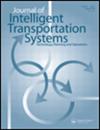Model-based dynamic toll pricing scheme for a congested suburban freeway with multiple access locations
IF 2.8
3区 工程技术
Q3 TRANSPORTATION
Journal of Intelligent Transportation Systems
Pub Date : 2023-11-02
DOI:10.1080/15472450.2022.2075702
引用次数: 0
Abstract
In this paper we propose a novel approach for alleviating traffic congestion in freeways with multiple access locations through the use of dynamic toll pricing. The pricing strategy is determined using model-based feedback control, with the underlying model derived using a combination of both traffic flow modeling and driver behavior. The traffic segment we focus on is a suburban freeway with multiple access locations. A model derived from the cell transmission method was utilized to develop the traffic flow model, with past traffic information from on-road sensors utilized for determining the model parameters. The behavior of the driver with respect to the choice of whether or not to enter the freeway segment is modeled using utility theory and the Value of Time (VOT) relative to the toll value. The proposed toll-pricing scheme is tested with traffic data from Portuguese freeway A5 and with different hypothesis on the driver’s VOT distribution, showing a significant improvement of the overall traffic conditions. The algorithm developed here provides an opportunity to improve on existing toll policy by guaranteeing more stable traffic conditions for the freeway users and optimizing the overall traffic throughput.
基于模型的城郊多通道拥挤高速公路动态收费方案
在本文中,我们提出了一种通过使用动态收费来缓解多通道高速公路交通拥堵的新方法。定价策略是使用基于模型的反馈控制来确定的,其基础模型是使用交通流建模和驾驶员行为的组合来导出的。我们关注的交通区段是具有多个入口的郊区高速公路。采用基于小区传输法的模型建立交通流模型,利用道路传感器的过往交通信息确定模型参数。驾驶员在选择是否进入高速公路路段时的行为采用效用理论和相对于收费价值的时间价值(VOT)建模。采用葡萄牙A5高速公路的交通数据和不同的驾驶员VOT分布假设对所提出的收费方案进行了测试,结果显示整体交通状况得到了显著改善。本文所开发的算法通过保证高速公路用户更稳定的交通条件和优化整体交通吞吐量,为改进现有收费政策提供了一个机会。
本文章由计算机程序翻译,如有差异,请以英文原文为准。
求助全文
约1分钟内获得全文
求助全文
来源期刊
CiteScore
8.80
自引率
19.40%
发文量
51
审稿时长
15 months
期刊介绍:
The Journal of Intelligent Transportation Systems is devoted to scholarly research on the development, planning, management, operation and evaluation of intelligent transportation systems. Intelligent transportation systems are innovative solutions that address contemporary transportation problems. They are characterized by information, dynamic feedback and automation that allow people and goods to move efficiently. They encompass the full scope of information technologies used in transportation, including control, computation and communication, as well as the algorithms, databases, models and human interfaces. The emergence of these technologies as a new pathway for transportation is relatively new.
The Journal of Intelligent Transportation Systems is especially interested in research that leads to improved planning and operation of the transportation system through the application of new technologies. The journal is particularly interested in research that adds to the scientific understanding of the impacts that intelligent transportation systems can have on accessibility, congestion, pollution, safety, security, noise, and energy and resource consumption.
The journal is inter-disciplinary, and accepts work from fields of engineering, economics, planning, policy, business and management, as well as any other disciplines that contribute to the scientific understanding of intelligent transportation systems. The journal is also multi-modal, and accepts work on intelligent transportation for all forms of ground, air and water transportation. Example topics include the role of information systems in transportation, traffic flow and control, vehicle control, routing and scheduling, traveler response to dynamic information, planning for ITS innovations, evaluations of ITS field operational tests, ITS deployment experiences, automated highway systems, vehicle control systems, diffusion of ITS, and tools/software for analysis of ITS.

 求助内容:
求助内容: 应助结果提醒方式:
应助结果提醒方式:


